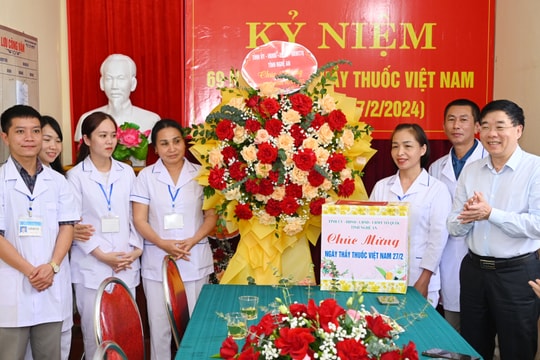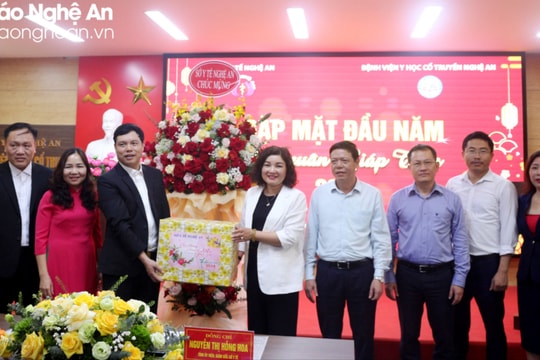Resident doctor Cao Thi Huyen Trang: 'I am moved by traditional medicine'
(Baonghean.vn) - That is the confession of a young female doctor, passionate about traditional medicine of the nation, with the desire to bring the quintessence of Oriental medicine closer to people's lives.
In today's life, with many modern treatment methods for health care, there are many people who are still faithful and persistent in treatment with Oriental medicine. "Gentle, interesting, painless, happy, satisfied" - are the sentences and words that patients who have experienced months of treatment at the Department of Traditional Medicine - Rehabilitation, Vinh City General Hospital, through the hands of this doctor, have felt.
Few people know that this female doctor has turned down many attractive job offers in big cities. She used to be a resident doctor at Hanoi Medical University Hospital. However, she still decided to return to her hometown - Vinh city, to continue pursuing and nurturing her passion from childhood. That is the female master, doctor Cao Thi Huyen Trang.
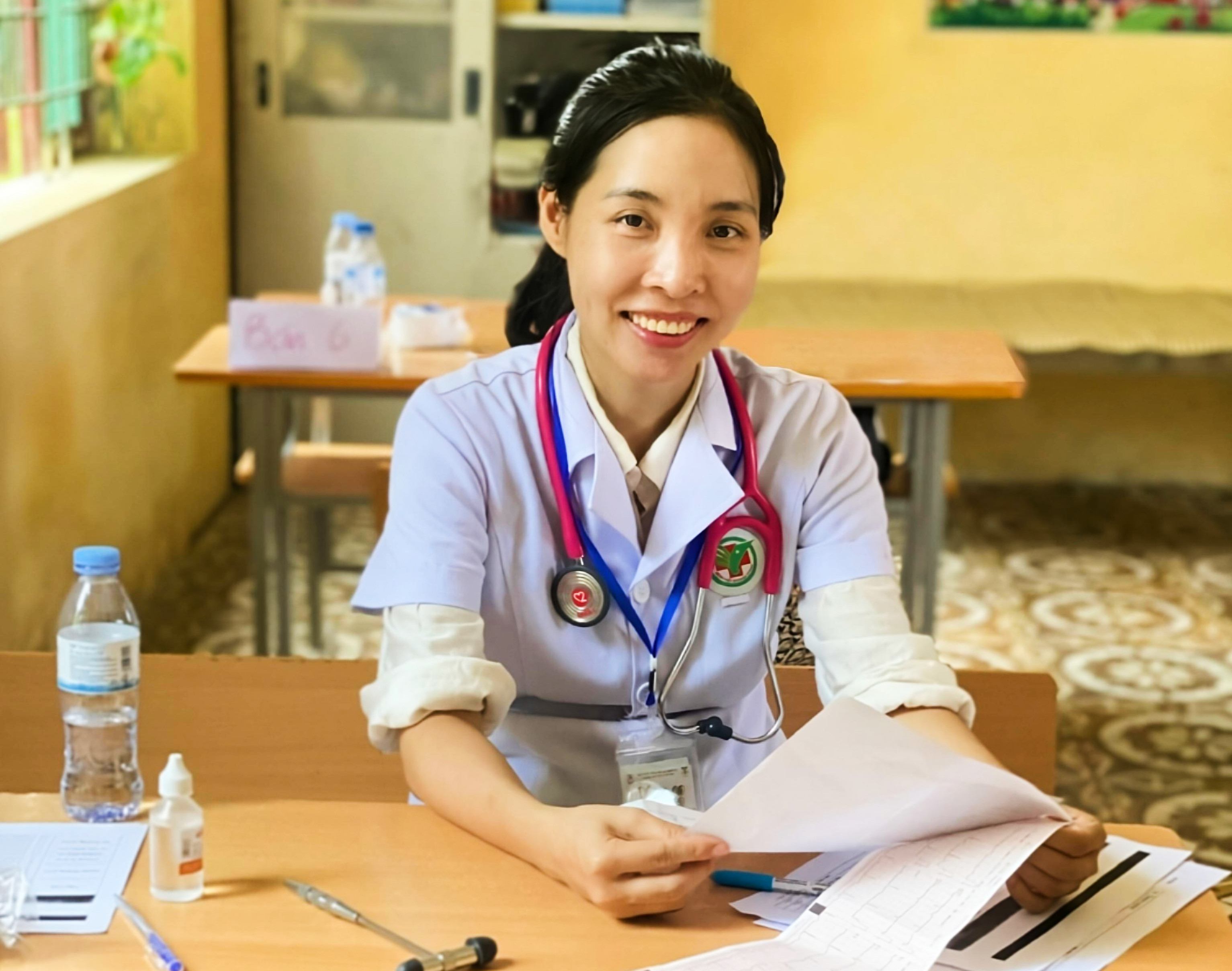
Nurturing love for traditional medicine
After many appointments, I finally got to “meet” Dr. Trang. My first impression was very different from my imagination of an Oriental medicine doctor - old and mature, Dr. Trang was a young, petite doctor with a bright smile, holding a handful of mulberry leaves in her hand. Seeing my curiosity, Dr. Trang smiled: “I like to collect plants. Today, the patient gave me a handful of mulberry leaves, they are very precious!”
Trang shared, not knowing whether traditional medicine came to her, or she came to traditional medicine. It was almost fate, a bond between the profession and the person since childhood. "I feel moved by traditional medicine" - Trang confided.
When she was still at the age of “not yet full, not yet worried”, Trang had a close friend who was also in high school in the small neighborhood where her family lived. This friend’s grandmother was a herbalist. When she visited her friend’s house, no matter where her friend went, Trang would still stand and watch her grandmother cut, prepare, and dispense herbs to treat illnesses. The first herbs Trang learned about were licorice, basil, musk, polygonum multiflorum, bamboo leaves... also from her friend’s grandmother. From that day on, it seemed like the only place the little student could play after school was her friend’s yard.
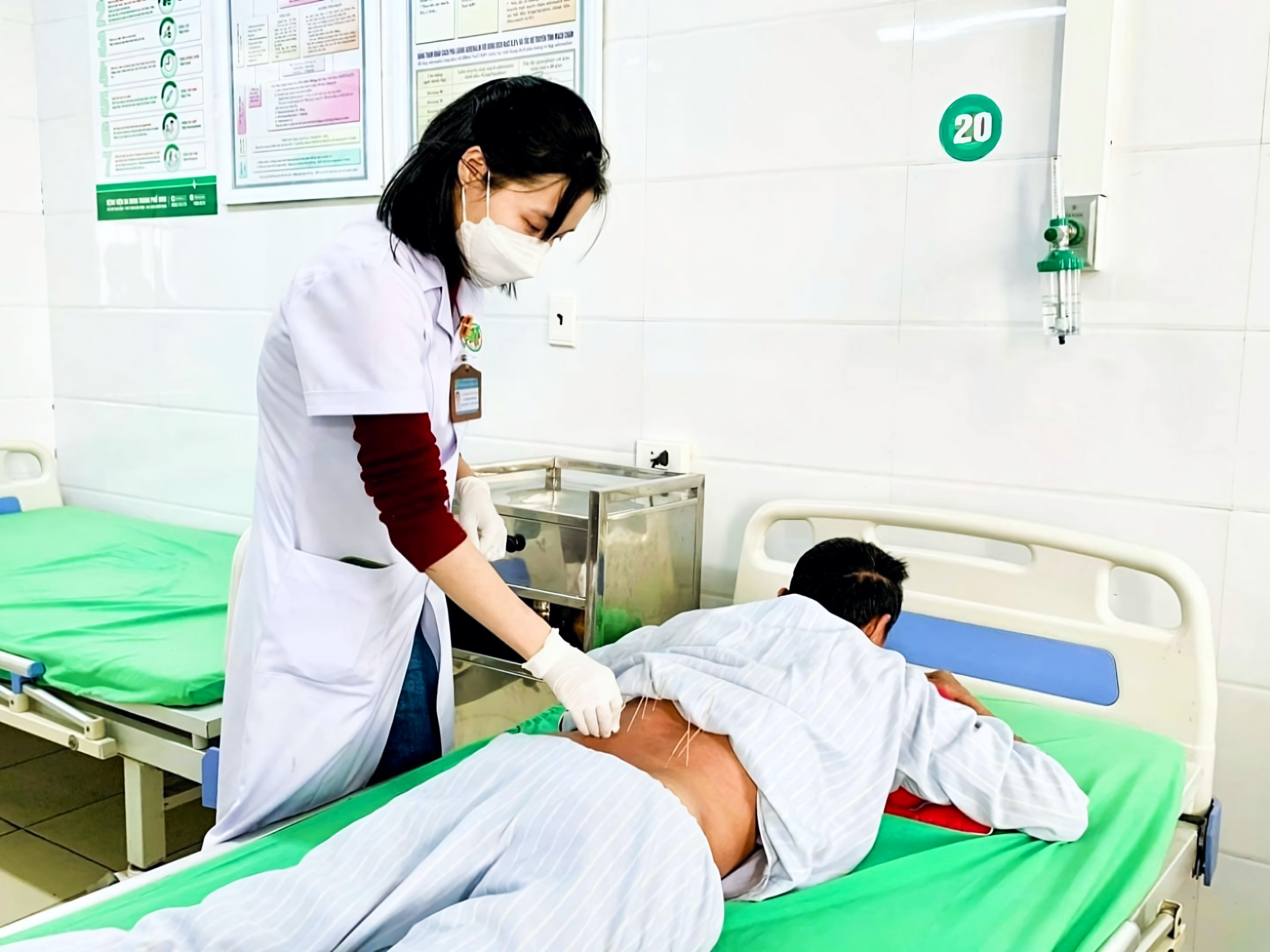
From those first medicinal herbs, little Trang at that time carried the passionate scent of Northern and Southern medicinal herbs into her dreams. Trang dreamed of becoming a traditional medicine doctor, prescribing medicine to cure diseases. The love for traditional medicine permeated little Trang in such a simple way. And it seemed that the fate between traditional medicine and Trang kept intertwining every day. And Trang touched her childhood dream by deciding to enroll in the Faculty of Traditional Medicine of Hanoi Medical University.
During her 6 years at Hanoi Medical University, Trang was both diligent in the lecture hall and applied to do an internship at traditional clinics to see how traditional physicians treated patients. Traditional medicine treatment methods, combined with Western physical therapy, and how to ensure that the treatment process for a patient does not conflict between the two methods were all learned, researched, and mastered by the Nghe An student. Trang also turned volunteer trips to the northern mountainous provinces into opportunities to study traditional ethnic medicine. The petite student both participated in social activities and did fieldwork, learning how ethnic people treat patients, because that is also a part of the nation's valuable experience in medicine. All of these things gradually developed.
“The more we delve into Eastern and Western medicine, the more we see that they have many similarities. Unlike what many people often say, the two methods "oppose" each other and cause trigger points (points that cause pain) for patients,” Dr. Huyen Trang shared.
That is what continues to motivate Trang to pursue her residency. A month of intense studying, in exchange for the result: Trang is one of the few students admitted to the residency. For Trang, that is “something she will never regret”. The 3 years of pursuing residency is the time when Trang continues to accumulate academic knowledge, while going to clinics to accumulate experience.
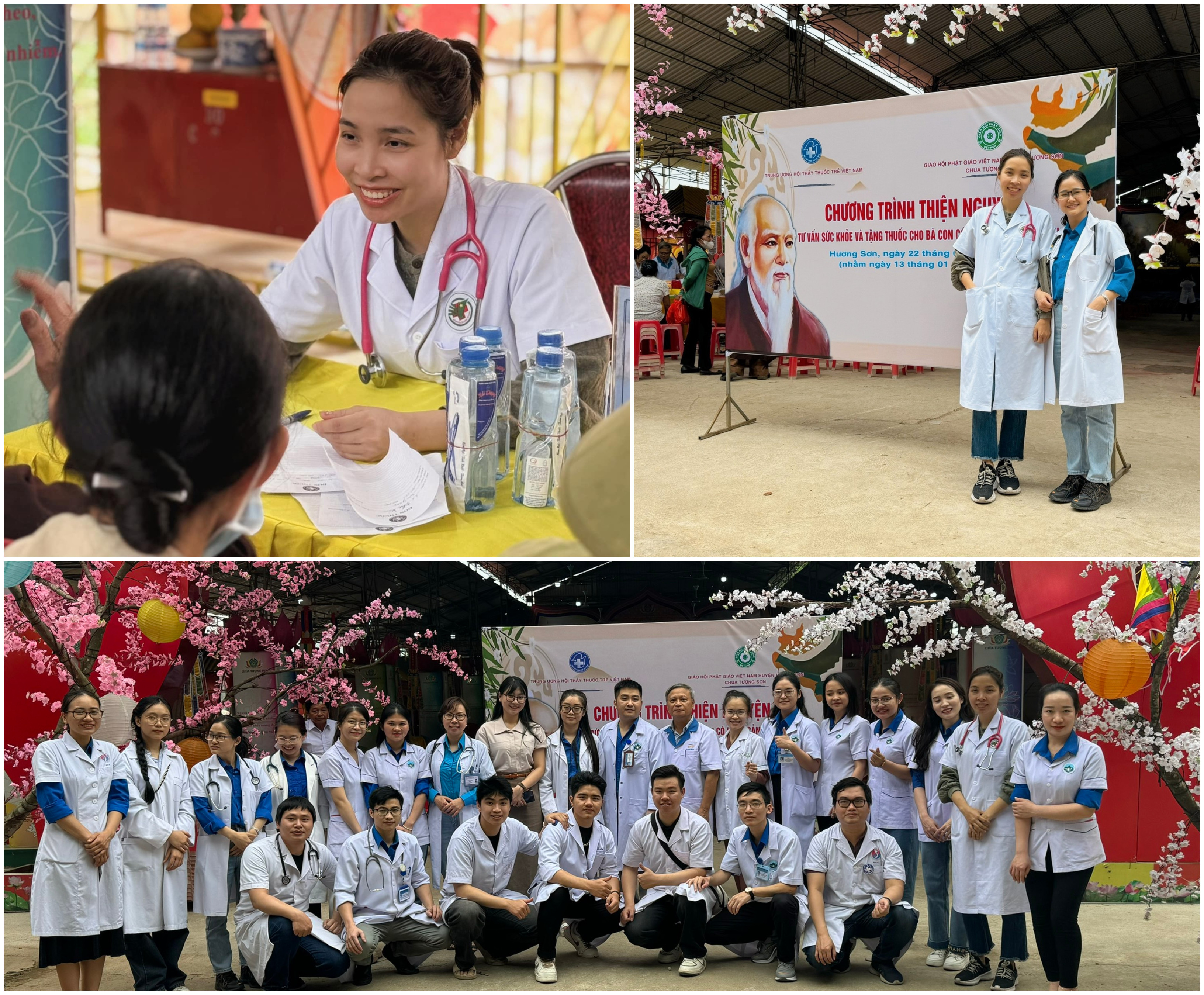
Bringing Oriental Medicine closer to life
Through the process of studying and researching, Trang has pointed out the outstanding advantages of Oriental medicine. Trang shared: “Oriental medicine uses ingredients completely from nature, so it is highly safe and has almost no side effects, even with long-term use. Oriental medicine prescriptions are as effective as Western medicine. Each patient is personalized with a prescription, a separate treatment regimen for each disease. This is different from Western medicine, which only uses a fixed prescription. That is both the quintessence and the difficulty of Oriental medicine.”
According to Dr. Trang, to successfully diagnose and treat diseases using Oriental medicine, the thinking, techniques and prescriptions must all follow the standards of Oriental medicine. And combine Western medicine when necessary tests and imaging are needed.
While chatting, I noticed Trang's two fingers - thumb and index finger - kept rubbing each other. Seeing me a little confused, Huyen Trang smiled: "It's a professional habit. This is the action of rotating the needle, sister!" It turns out, learning acupuncture is not simple at all. Learning about acupuncture points is even more difficult, although Trang happily shared that "my life has nothing but acupuncture points. Anyone can hold a needle to prick, but how to prick to cure a disease is another story. Sometimes the needle tilts to the left, sometimes to the right, each angle of the needle must be suitable for the patient's condition at each time. And through that treatment process, how to make the patient feel healthy, mentally liberated, blood circulation, and stable meridians.
Trang confided that the secret in Oriental medicine is the angle and depth of the needle, which is the "tonifying and draining technique". Each Oriental medicine doctor can easily share the prescription with each other, and adjust the medicine for each patient accordingly. However, the tonifying and draining technique depends on each person's medical skills. While acupuncture, you have to check the pulse, only then will you know if you are doing the acupuncture correctly or not.
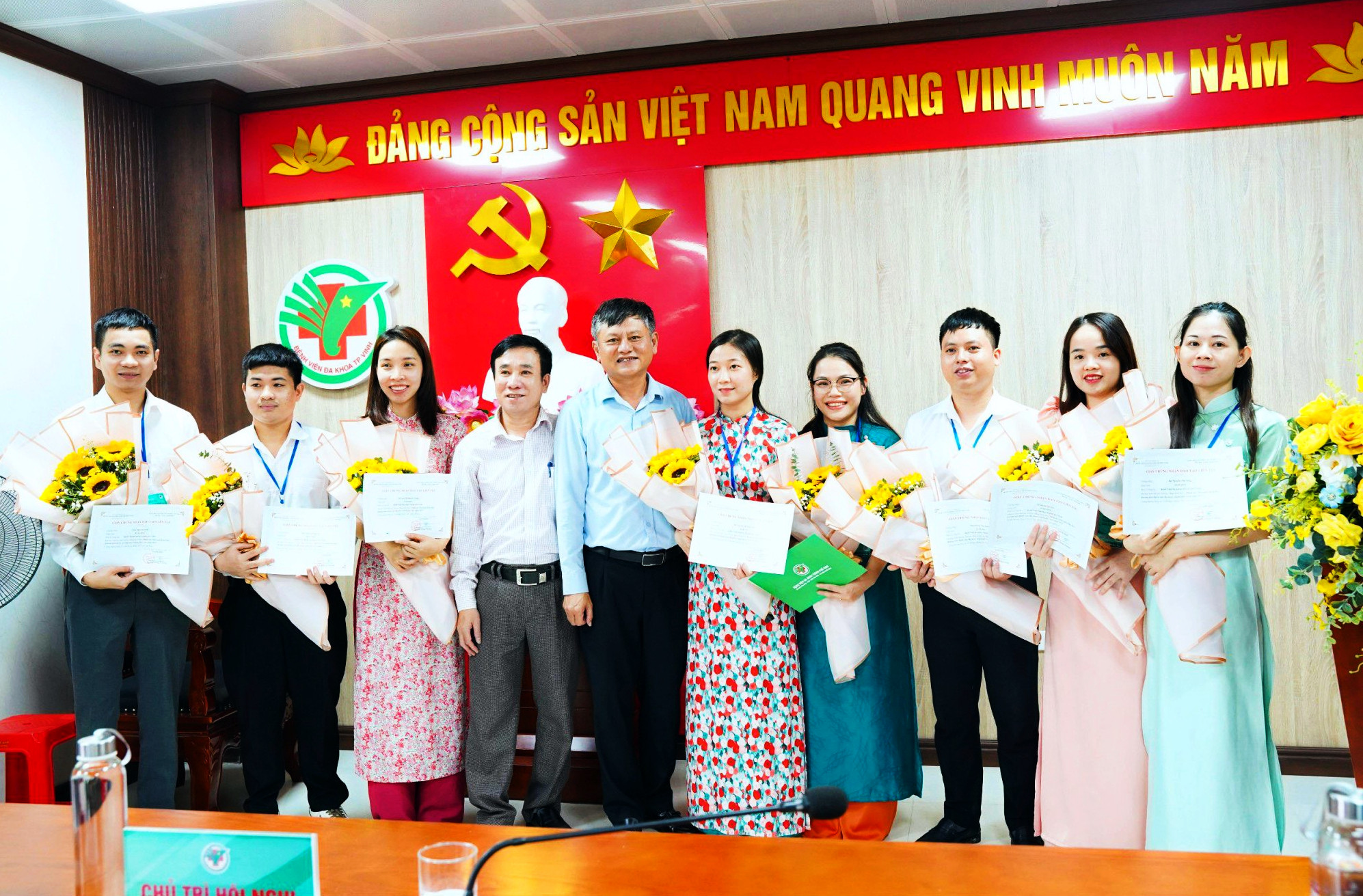
Doctor Trang believes that Eastern medicine does not have any medicine to cure stomach, sore throat, or herniated disc, but it all lies in regulating the pulse, helping the body absorb nutrients, and produce “fighting” cells. A healthy pulse means a healthy person. There are specific pulses for each type of disease, even serious diseases.
So to have a good pulse, in Dr. Trang's opinion, the most "valuable" medicines are not on the doctor's prescription, but in the patients themselves. Exercise is medicine, good sleep is medicine, a balanced diet is medicine, laughter is medicine, a positive attitude is medicine. Patients who come to Dr. Trang are advised to exercise, sleep well, and always be positive.
For each patient, Dr. Huyen Trang struggles to find the root cause, whether it is a psychological illness, a neurological illness, a spinal illness... or something else. Because Eastern medicine will help patients treat the root cause, instead of treating the symptoms. There are diseases that Western medicine cannot do anything about, but Eastern medicine can "make a difference".
To bring oriental medicine into daily life in the most natural way, Trang always tries to find the most rustic and familiar herbs, but with high medicinal properties to put into the prescription such as cinnamon, yam, earthworms... Along with that, Dr. Trang always tries to shorten the treatment process as quickly as possible, both shortening the time and cost, limiting the need for patients to travel many times, not having to stay in the hospital for too long, reducing pressure on the hospital, but still bringing positive results. "For some diseases, I remove this herb, but add another herb. In a short time, it reduces costs for people and increases the use of oriental medicine," Trang shared.
As a young person, Dr. Trang also uses digital platforms to propagate and disseminate medical knowledge to people, such as instructions on breathing exercises, therapeutic exercises to stretch and strengthen muscles, and warnings about drug abuse...
Waiting for a "Small Page version"
Our conversation was interrupted by a little girl calling out: “Mommy…”. When asked about her small family, anchoring her emotions in a smile, Trang told us about her little girl, that regardless of winter or summer, she always wanted to wear a doctor’s uniform to go to school. At home, when her mother was working, her little girl always clung to her and picked up small medicinal herbs such as wolfberry, chrysanthemum, licorice…
Who knows! Like a thread of love for plants, flowers, and medicinal herbs from the mother, the baby might become a version of “Little Trang” in the future! It’s so warm to think about this.
As a literature lover, to Trang, literature and medicine seem to be very different, but at least to this young doctor, they are not strange. “Literature is anthropology. And the highest goal of medicine is also to aim for noble human values”./.

